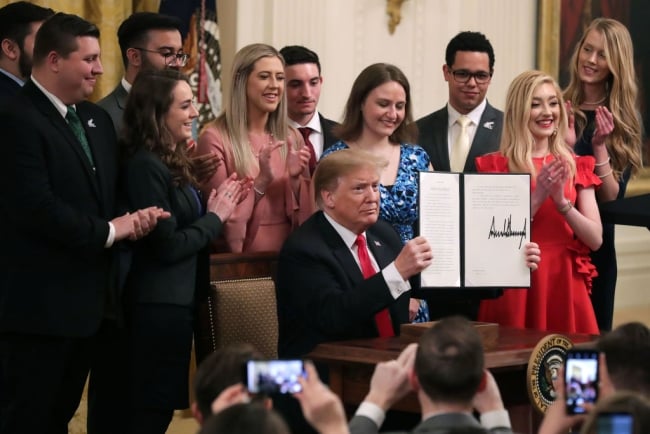You have /5 articles left.
Sign up for a free account or log in.

Getty Images
President Trump on Thursday delivered on his promise of an executive order that would hold colleges that receive federal research funding accountable for protecting free speech.
However, his bombastic rhetoric in a White House East Room ceremony wasn't matched by the modest language of the order.
"If a college or university does not allow you to speak, we will not give them money. It's that simple," he said Thursday.
But the executive order essentially directs federal agencies to ensure colleges are following requirements already in place. And it doesn't spell out how enforcement of the order would work.
It directs 12 federal grant-making agencies to coordinate with the Office of Management and Budget to certify that colleges receiving federal research funds comply with existing federal law and regulations involving free academic inquiry. While the administration expects public institutions to uphold the First Amendment, the order says, private colleges are expected to comply with their "stated institutional policies" on freedom of speech. The free-speech directive doesn't apply to federal student aid programs.
The document also directs the Education Department to publish program-level data in the College Scorecard on measures of student outcomes, including earnings, student debt, default rates and loan repayment rates.
And it requires the department to submit policy recommendations to the White House by January 2020 on risk-sharing proposals for colleges that participate in the federal student loan program.
The executive order puts extra force behind several policies the White House has backed previously. For example, earlier this week the administration released a report on priorities for reauthorization of the Higher Education Act that included program-level data and a new accountability system for colleges.
President Trump has weighed in repeatedly on alleged suppression of free speech on campuses, especially speech by conservative students. Most recently, he announced plans for an executive order addressing the issue at the Conservative Political Action Conference, an annual gathering of activists and elected officials.
"Free inquiry is an essential feature of this nation's democracy, and it promotes learning, scientific discovery and economic prosperity," the order reads. "We must encourage institutions to appropriately account for this bedrock principle in their administration of student life and to avoid creating environments that stifle competing perspectives, thereby potentially impeding beneficial research and undermining learning."
The executive order had been in the works long before the president’s comments at the conservative event.
But it’s not clear what kind of teeth the order has beyond new certification requirements for institutions. A senior administration official told reporters on Thursday that federal agencies will enforce it the same way they enforce existing federal grant conditions, which colleges already are required to follow. The official didn’t address details about how the order would be implemented.
Agencies covered by the order include the Departments of Education, Defense, Interior, Agriculture, Commerce, Labor, Health and Human Services, Transportation, and Energy, as well as the Environmental Protection Agency, National Science Foundation and NASA.
It says those agencies should "take appropriate steps, in a manner consistent with applicable law, including the First Amendment, to ensure institutions that receive federal research or education grants promote free inquiry through compliance with all applicable federal laws, regulations and policies."
Trump has repeatedly threatened federal funding for colleges and universities, beginning in 2017, when violent protests led the University of California, Berkeley, to cancel a planned lecture by Milo Yiannopoulos, a conservative provocateur with a history of inflammatory statements disparaging women and minorities. And last month at the Berkeley campus, an activist with the conservative student group Turning Point USA was punched in the face by another man. Neither attended the university, and campus police later arrested the assailant. But Trump had the activist, Hayden Williams, appear on stage with him at CPAC and urged him to sue the university.
The president's message has been that colleges should either guarantee free speech or risk losing federal money. Jeff Sessions, the administration's first attorney general, also made campus free speech a key issue for the Justice Department. Under Sessions, the DOJ filed statements of interest in several ongoing lawsuits involving issues such as campus free speech zones.
On Thursday, Charlie Kirk, the founder of Turning Point, called the executive order "historic."
Reactions to the Order
However, higher education leaders and groups have said the long-promised executive order is a solution in search of a problem. Research universities and other public colleges promote free speech and academic freedom as part of their mission, the groups have argued. And Congress, not the president, controls appropriations to colleges and universities.
Peter McPherson, president of the Association of Public and Land-grant Universities, said the executive order is unnecessary.
“Public universities are already bound by the First Amendment and work each day to defend and honor it. The commitment to free speech, the vigorous exchange of ideas and academic freedom go to the very core of what public universities are all about. It is inherent to their very identity,” he said in a statement. “As institutions of higher learning, public universities are constantly working to identify new ways to educate students on the importance of free expression, provide venues for free speech and advance our world through free academic inquiry. No executive order will change that.”
Ted Mitchell, president of the American Council on Education, said the order was unnecessary and "could lead to unwanted federal micromanagement of the cutting-edge research that is critical to our nation’s continued vitality and global leadership." He urged the administration to consult with higher ed institutions as it carried out the order.
Julie Schmid, executive director of the American Association of University Professors, said the executive order appeared to accomplish little procedurally, "but is troubling in that it serves a broader goal of attempting to discredit higher education."
The lack of detail in the order also raises questions for colleges about how it will be carried out. Although the order directs federal agencies to coordinate with OMB in carrying out the rule, the administration official said it's more likely that each agency would issue guidance tailored to its particular grant programs.
"At the moment we anticipate each agency, in coordination with the general counsel's office, would be the arbiter," the official said.
Jonathan Friedman, project director for campus free speech at PEN America, said that approach virtually guarantees inconsistent interpretations at federal agencies. And he said linking research grant funding to free speech protections could have the effect of chilling some speech, because it conveys to faculty members and administrators that they are being watched by the federal government.
"It's essentially an order designed to create a lot of chaos and confusion," Friedman said.
He said Trump's focus on conservatives being censored on campus raises questions about whether his administration will apply speech protections for all points of view.
"There's no question that a more bipartisan or even-handed approach to free expression would be much wiser," Friedman said.
But Joe Cohn, legislative and policy director at the Foundation for Individual Rights in Education, said it was too early to praise or criticize the executive order without more details.
"We haven't seen what the agencies plan to do. That work has yet to happen," he said. "We have seen throughout our history at FIRE how censorship has victims on every part of the political spectrum. How the agencies take their next steps will be important in determining whether or not the public can trust the federal government to protect the rights of all speakers, and not just speakers with whom they politically agree."
Lamar Alexander, the GOP chairman of the Senate education committee, cautioned against Congress or the president getting involved in defining what can be said on campus.
“The U.S. Constitution guarantees free speech," Alexander said. "Federal courts define and enforce it. The Department of Justice can weigh in. Conservatives don’t like it when judges try to write laws, and conservatives should not like it when legislators and agencies try to rewrite the Constitution.”
The college-transparency component of the order directs the Education Department to by 2020 produce a website that will allow student loan borrowers to view information about their loans, including their total debt, monthly payment when entering repayment and available repayment options. Betsy DeVos, the U.S. secretary of education, already had announced plans to create a single website for student borrowers as part of an overhaul of the federal loan-servicing system.
The expanded College Scorecard will include data for each certificate, degree and graduate and professional program on median earnings, median debt, Graduate PLUS loan debt, Parent PLUS loan debt and other metrics. The order directs the Treasury Department to work with the Education Department to produce program-level earnings data. And it directs the Education Department to submit, in consultation with the Treasury Department, recommendations by January 2020 to reform the collections process for defaulted federal student loans.
The White House said last year that it would release additional program-level data through the Scorecard. After the Education Department announced it would rescind the gainful-employment rule, which applied only to career education programs, officials said the additional program-level information would replace the rule and provide accountability for all colleges.
Amy Laitinen, director for higher education at New America's education policy program, said the order reflects how policy makers increasingly recognize that students need more information before making important and expensive decisions on where to enroll. But she said expanding the Scorecard would still leave out roughly 30 percent of students who aren't counted right now because they don't receive federal aid.
"If we want to count all students, Congress has to do it," she said. "The truth is there's only so much the administration can do because of existing law."




